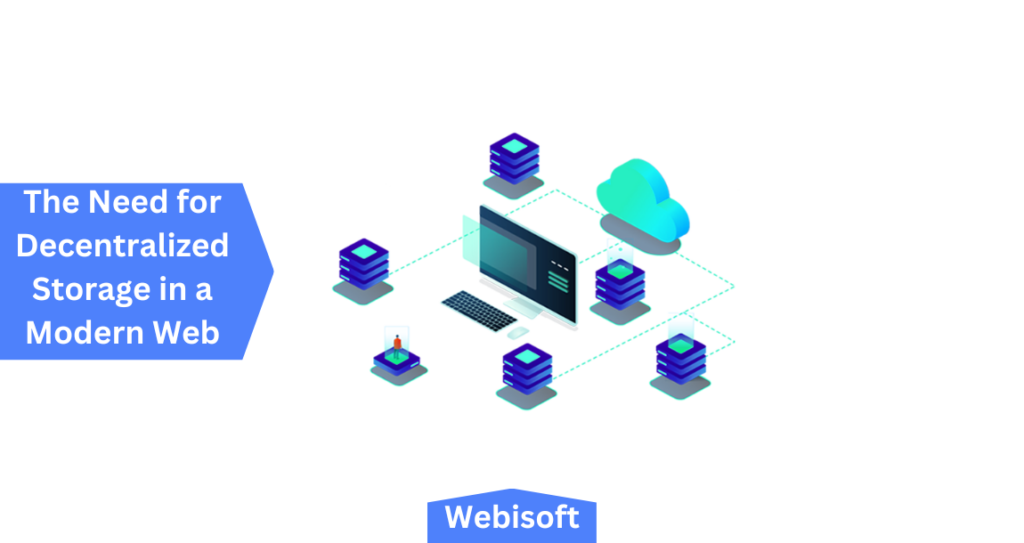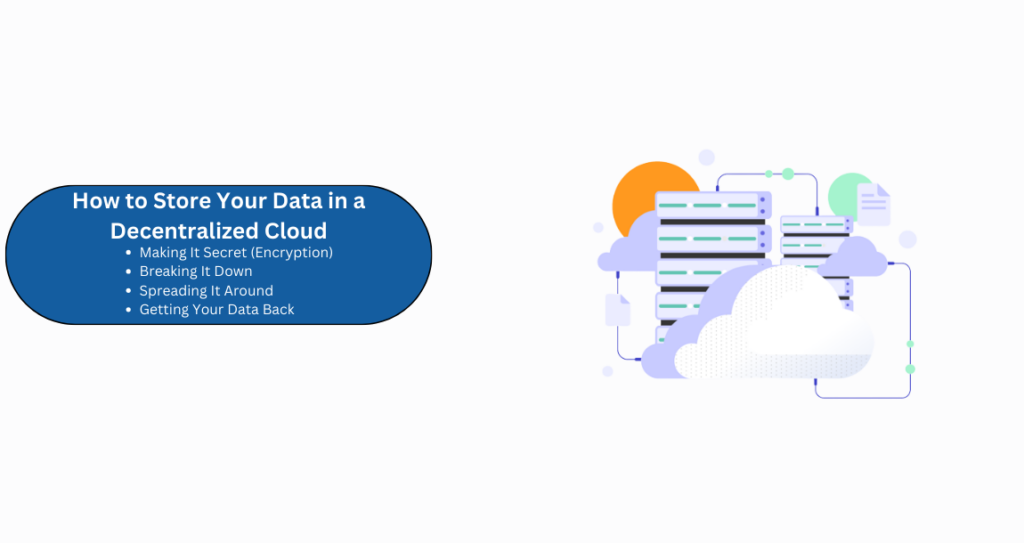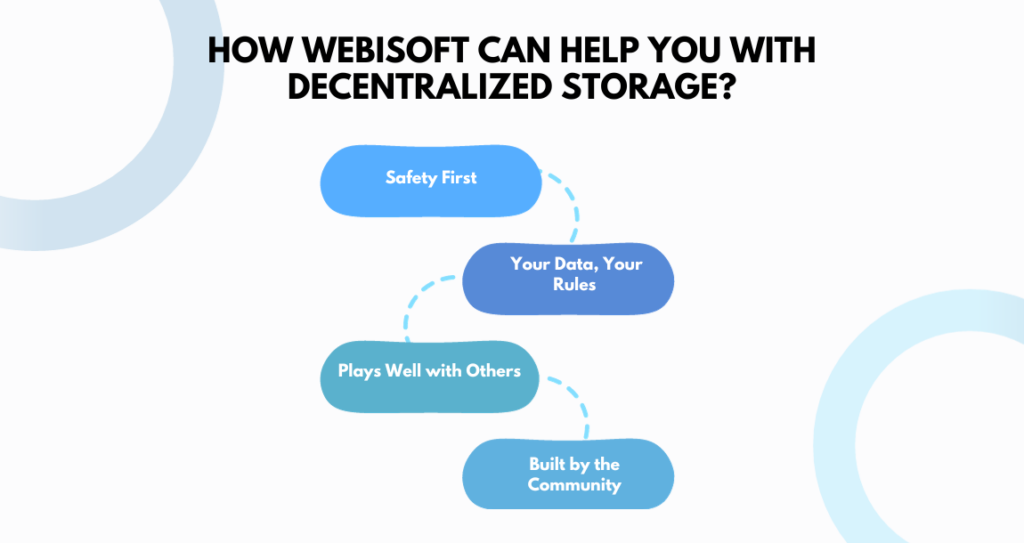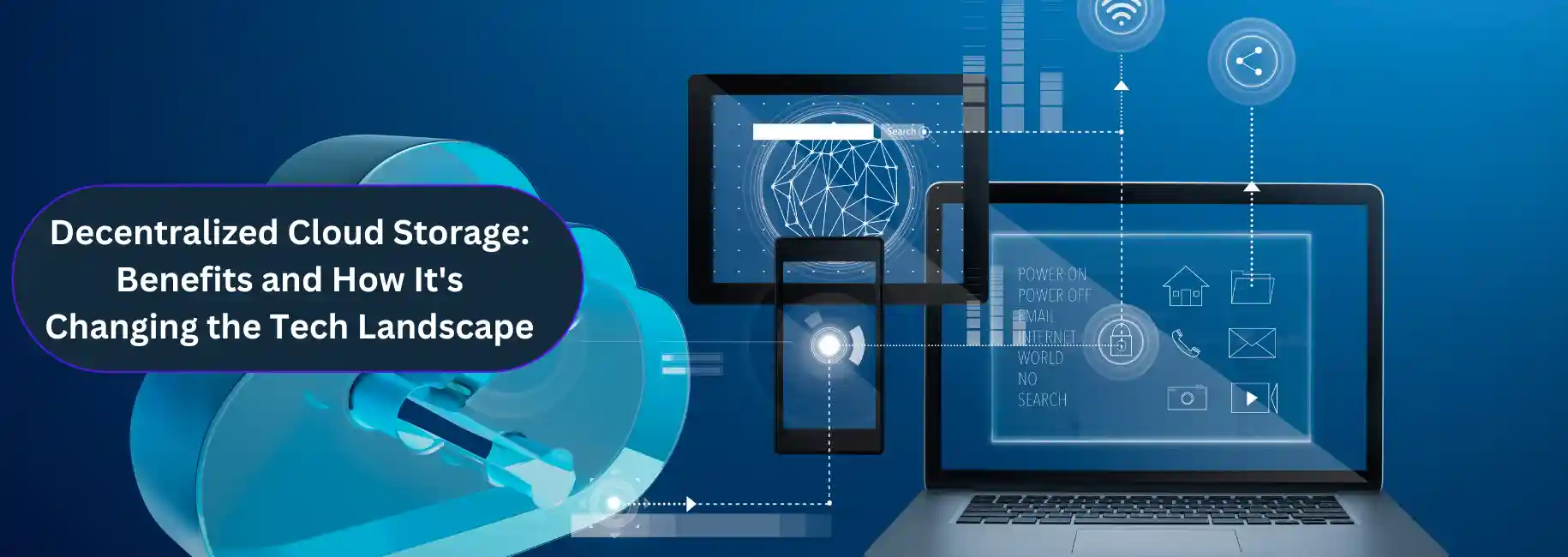In today’s digital age, our online activities produce vast amounts of data. This data is invaluable for businesses Many companies turn to cloud storage providers like Amazon, Google, and Dropbox to manage this data, as it’s cost-effective and facilitates easy sharing.
However, a concern arises with these services centralizing data storage. This centralization poses risks of unauthorized access, sharing, or potential data loss due to technical issues.
Here’s where things get interesting. Imagine combining the power of decentralized cloud storage using blockchain.
What you get is decentralized cloud storage. In this piece, we’ll look at its benefits, how it functions, and why it might just be the storage solution of the future for businesses.
Contents
The Basics of Cloud Storage
First, let’s know what centralized cloud storage is. Here, it’s all about the location. To get to your data, you need to know exactly where it’s stored online. Think of it like finding a book in a library by its exact shelf location.
And how do you find this location? Through web links or URLs. But there’s a catch. Because the data has a fixed spot:
- It’s easier for unwanted folks (like hackers) to figure out where your data is and misuse it.
- If the data moves, that web link won’t work anymore.
- Shifting the Focus with Decentralized Cloud Storage
Now, what is decentralized storage then? Well, here, it’s not about where your data is, but what your data is.
It’s like finding that library book by its content, not its shelf. Why? Because the data isn’t in one spot. It’s spread out everywhere on a vast network.
The Best of Both Worlds with DCS
This is where decentralized cloud storage shines. It gives your data the safety of being on your personal computer but makes it available everywhere. How?
It breaks your data into pieces, encrypts it for safety, and then scatters it across many computers all over the world. Think of it as having bits of your data on multiple computers that you can access from anywhere.
And the best part is it’s super safe. No single company has control over it, there’s no risk of someone peeking in, and because it’s encrypted, it’s tough to hack.
The Need for Decentralized Cloud Storage in a Modern Web

There are two reasons why you should want decentralized storage in the modern web. They are,
Location-Based Storage
Think about the usual way we store data online. It’s like trying to find a book in a massive library.
If someone recommends a book, just knowing its title isn’t enough. You’d need to know the library, the section, the shelf, and the exact spot to find it. But what if the book gets moved? You’re out of luck.
And here’s a surprising fact also. Nearly half of the web links cited in US Supreme Court decisions don’t work anymore. They point to places where the content used to be but isn’t now.
Therefore, storing data based on its location isn’t the best method.
Focusing on Content
Well, there are systems like IPFS, Sia, and Storj that think differently. Instead of telling you where the data is, they tell you what the data is. They use a unique link that describes the data’s content, not its place.
It’s a bit like having a unique fingerprint for each piece of data. And the magic behind this is Blockchain technology.
By focusing on content rather than location, free, decentralized cloud storage can move across a global network of computers.
You can share or get your data from any of these computers. And if you want, you can even choose only to get data from computers you trust.
How to Store Your Data in a Decentralized Cloud?

Let’s break down how this works, step by step:
1. Making It Secret (Encryption)
Before anything goes into the DCS, it’s locked up tight. This means only you and the people you choose can unlock and see it. And if you change your mind, you can always take away that access.
The great part is, that even the DCS provider can’t peek at your data because it’s encrypted. Different DCS systems might lock up the data in slightly different ways.
2. Breaking It Down
After locking, the object is broken into smaller parts. Think of it like a puzzle. Each object becomes 80 puzzle pieces, and these pieces are spread out to different computers in different places.
The beauty of this is that you don’t have to trust the DCS provider completely. Because they only have puzzle pieces, not the whole picture. To see the full object, you’d need at least 29 of those pieces.
And obviously, that’s not happening without the right keys and permissions.
3. Spreading It Around (Globally Distributed)
Now, those puzzle pieces? They’re sent to computers all over the world. This means your object isn’t just sitting in one spot.
Hence, things like system failures or data breaches at one location won’t affect your data.
4. Getting Your Data Back
When you want your data back, you need to gather 29 of those 80 puzzle pieces. Even if some computers are offline, it won’t stop you from getting your data. It’s designed to be resilient and always accessible.
How Webisoft Can Help You with Decentralized Storage?

Centralized storage systems have their limitations, especially when it comes to privacy and security. That’s where Webisoft steps in.
We’ve crafted a decentralized storage solution that makes it easy for businesses and developers to store data on the IPFS network.
On top of that here developers can easily add or move data to our platform without diving deep into code changes. With our solution, you get:
- Default Encryption: Your data is locked up tight from the get-go.
- Full Privacy: From start to finish, your data remains private.
- Speed and Performance: Quick, reliable, and always up to the mark.
- Top-Notch Security: We’ve got your back when it comes to keeping your data safe.
Now, let’s see why Webisoft stands out:
1. Safety First (Security)
Our platform is designed with security at its core. We encrypt your data, split it, and distribute it globally to keep it secure.
2. Your Data, Your Rules (Private)
You’re in the driver’s seat. You decide who gets to see your data and when. And rest assured, even we can’t peek at it.
3. Plays Well with Others (Cloud Compatible)
Our solution fits right in with the cloud tools you’re already using. Whether it’s Azure, S3, or Google Cloud, we’ve got you covered.
4. Built by the Community (Open-source)
Our platform is open to all. Talented developers from various fields chip in to make it better. And if you’re passionate about decentralized storage and blockchain, we’d love to have you on board.
The Bottom Line
Decentralized Cloud Storage prioritizes security and privacy. But like any new technology, it faces skepticism. Some question its reliability and speed, while others are wary of storing data on unfamiliar computers.
However, DCS is more than just an idea. It’s a functional solution rooted in blockchain principles, ensuring trustworthiness. As with all emerging technologies, DCS continues to evolve and improve.
Ready to revolutionize your data storage? Get to know decentralized cloud storage with Webisoft and secure your data like never before. Contact us today!
FAQs
How does blockchain technology relate to DCS?
Blockchain’s principles of decentralization and encryption are foundational to DCS, ensuring data integrity and trustworthiness.
Are there any limitations to using DCS?
Like any technology, DCS is evolving. Current challenges might include ensuring consistent speed and further refining data retrieval processes.
Can I switch from my current centralized storage to DCS easily?
Transitioning requires some setup, but many DCS providers offer tools and support to facilitate the migration process.
Is DCS suitable for businesses of all sizes?
Yes, from startups to large enterprises, any business prioritizing data security and accessibility can benefit from DCS.

